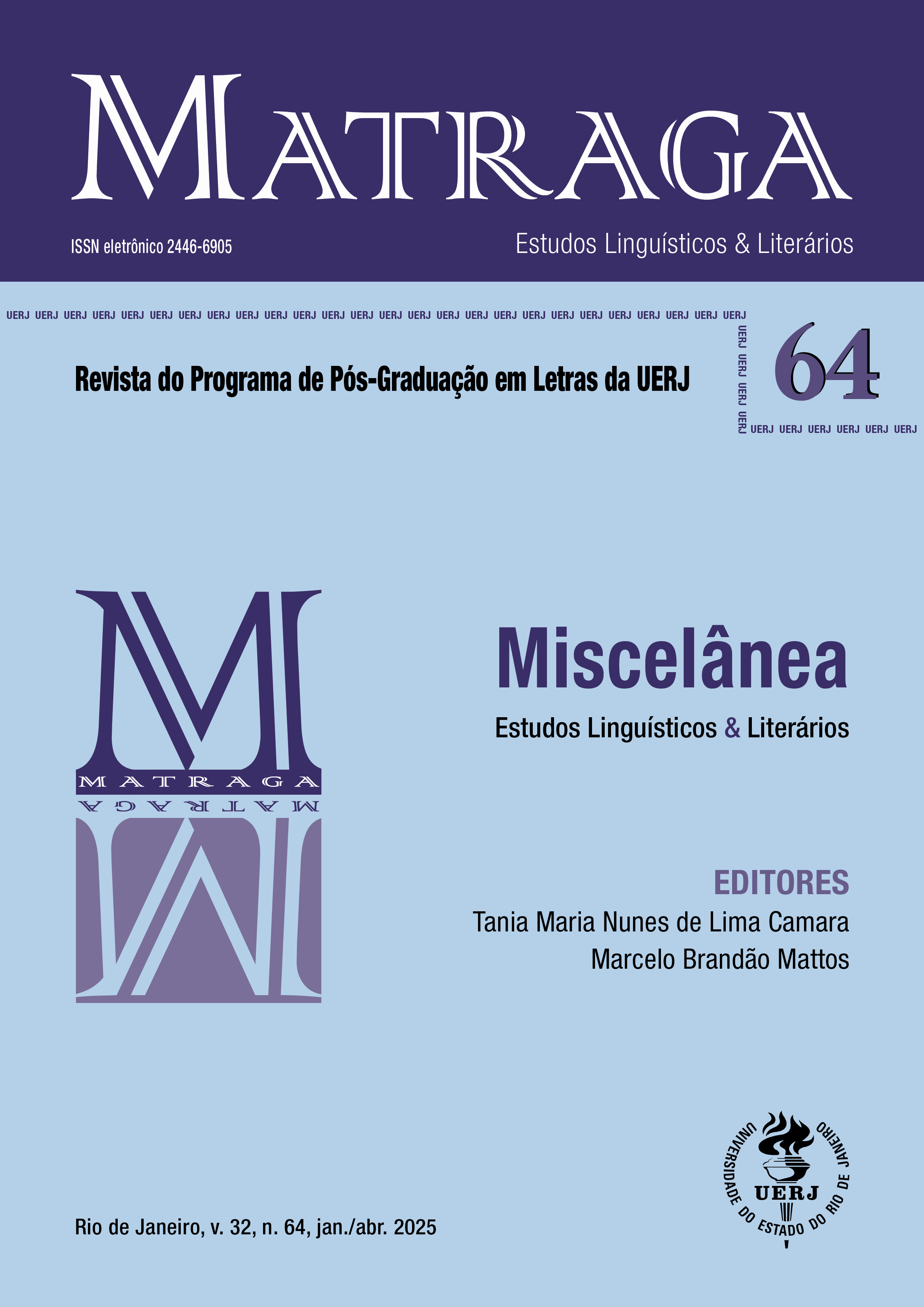Eu, no singular, plural: a obra Menino sem passado como um vasto tecido de subjetividades
DOI:
https://doi.org/10.12957/matraga.2025.85277Palavras-chave:
Subjetividades, Alterficção, Menino sem passado, Silviano SantiagoResumo
Este artigo discute as expansões da subjetividade do narrador-personagem em Menino sem passado, de Silviano Santiago. Na narrativa, o escritor se reinventa como protagonista, autodenominando-se “menino sonâmbulo”, para narrar suas memórias de infância. Tal sonambulismo sinaliza a natureza híbrida do sujeito e de suas lembranças, compreendendo o eu como um tecido de alteridades que coexiste no real e no inventado e que cultiva uma “obsessão de querer ser outro” (Santiago, 2021a, p. 36). Para tanto, valemo-nos do neologismo alterficção, de Nascimento (2017), como categoria de reflexão para pensarmos na reinvenção de si, na escrita, a partir das redes de intersubjetividade. Também nos ancoramos em Collot (2004, 2006) e no próprio Santiago (2004), a fim de refletirmos sobre os modos como essa relação eu-outro se manifesta na obra. Nessa linha intersubjetiva, abordamos a “comunidade textual” – ideia barthesiana aqui retomada por Carvalhal (2006) – que se estabelece entre Menino sem passado e Alguma Poesia, de Carlos Drummond de Andrade, em especial o poema “Infância”. Assim, na constante busca por se reinventar, Silviano Santiago recusa as heranças patriarcais que insistem em prescrever sua vida e, com isso, assume como seu único e legítimo testamento essa poética de Drummond. Tal conversa entre os autores mineiros foi subsidiada por Barthes (1971), Carvalhal (2006), Kristeva (2005), Merquior (2012), Villaça (2006) e Santiago (2006, 2021b).
Downloads
Referências
ANDRADE, Carlos Drummond de. Alguma Poesia. 1. ed. São Paulo: Companhia das Letras, 2013.
ANDRADE, Carlos Drummond de. Boitempo: Menino antigo. 1. ed. São Paulo: Companhia das Letras, 2017.
BAKHTIN, Mikhail. Estética da criação verbal. Tradução de Paulo Bezerra. São Paulo: Martins Fontes, 2003. BARTHES, Roland. S/Z. Paris: Seuil, 1971.
CARVALHAL, Tania Franco. Intertextualidade: a migração de um conceito. Via Atlântica, São Pau- lo, v. 1, n. 9, p. 125-136, jun. 2006. Disponível em: <https://www.revistas.usp.br/viaatlantica/article/
view/50046/54174>. Acesso em: 20 abr. 2024.
CHKLOVSKI, Viktor. A arte como procedimento (1917). In: EIKHENBAUN, Boris et al. Teoria da literatura: formalistas russos. Porto Alegre: Globo, 1973. p. 39-56
COLLOT, Michel. O sujeito lírico fora de si. Revista Terceira Margem, Rio de Janeiro, v. 8, n. 11, p. 165- 177, 2004. Disponível em: <https://revistas.ufrj.br/index.php/tm/article/view/37857>. Acesso em: 17 mar.
2024.
COLLOT, Michel. O Outro no Mesmo. Alea: Estudos Neolatinos, Rio de Janeiro, v. 8, n. 1, p. 29-38, jan./ jun. 2006. Disponível em: <https://www.scielo.br/j/alea/a/8VWqTCvcmmzYxkZKNkHGKfs/>. Acesso em: 12 mar. 2024.
KRISTEVA, Julia. A Palavra, o Diálogo e o Romance. In: KRISTEVA, Julia. Introdução à semanálise. Tradu- ção de Lúcia Helena França Ferraz. 2. ed. São Paulo: Perspectiva, 2005. p. 65-95.
MERQUIOR, José Guilherme. Verso Universo em Drummond. Tradução de Marly de Oliveira. 3. ed. São Paulo: É Realizações Editora, 2012.
MINAS MUNDO. Palestra Menino sem passado em pauta. Produção do 53º Festival de Inver- no da UFMG. Youtube, 16 nov. 2021. Disponível em: <https://www.youtube.com/watch?v=GZvehYyamec>. Acesso em: 20 mar. 2024.
MIRANDA, Wander Melo. Contracapa. In: SANTIAGO, Silviano. Menino sem passado (1936-1948). 1. ed. São Paulo: Companhia das Letras, 2021.
NASCIMENTO, Evando. Autoficção como dispositivo: alterficções. Matraga: Revista do Programa de Pós-
-Graduação em Letras da UERJ, Rio de Janeiro, v. 24, n. 42, p. 611-634, 2017. Disponível em:
-publicacoes.uerj.br/matraga/article/view/31606> Acesso em: 13 jan. 2024.
NASCIMENTO, Evando. Matérias-primas: entre autobiografia e autoficção. Cadernos de estudos culturais, Campo Grande, v. 2, n. 4, p. 59-75, jul./dez. 2010. Disponível em: <https://periodicos.ufms.br/index.php/
cadec/article/view/4489>. Acesso em: 12 mar. 2024.
RIMBAUD, Arthur. Correspondência. Tradução de Ivo Barroso. Rio de Janeiro: Topbooks, 2009. ROSA, João Guimarães. Grande sertão: veredas. Rio de Janeiro: Nova Fronteira, 1986.
SANTIAGO, Silviano. 1ª parte da biografia de Silviano Santiago é exemplo de grande autor memorialista [en- trevista concedida a Antonio Gonçalves Filho]. GZH: cultura e lazer, Porto Alegre, fev. 2021b.
SANTIAGO, Silviano. Convite à leitura dos poemas de Drummond. In: SANTIAGO, Silviano. Ora (direis) puxar conversa!: ensaios literários. Belo Horizonte: Editora UFMG, 2006. p. 9-57.
SANTIAGO, Silviano. Eu & as galinhas-d’angola. In: SANTIAGO, Silviano. O cosmopolitismo do pobre: crítica literária e crítica cultural. Belo Horizonte: Editora UFMG, 2004. p. 26-29.
SANTIAGO, Silviano. Meditação sobre o ofício de criar. Aletria: Revista de Estudos de Literatura Rememora- ções/Comemorações, Belo Horizonte, v. 18, n. 2, p. 173-179, jul./dez. 2008. Disponível em: https://periodicos. ufmg.br/index.php/aletria/article/view/18216. Acesso em: 27 jan. 2024.
SANTIAGO, Silviano. Menino sem passado (1936-1948). 1. ed. São Paulo: Companhia das Letras, 2021a. SANTIAGO, Silviano. Silviano Santiago: o literato cosmopolita [entrevista concedida à Christina Queiroz].
Revista Pesquisa FAPESP, São Paulo, ed. 292, jun. 2020. Disponível em: https://revistapesquisa.fapesp.br/ silviano-santiago-o-literato-cosmopolita/. Acesso em: 18 jan. 2024
VILLAÇA, Alcides. Passos de Drummond. São Paulo: Cosac Naify, 2006.
Downloads
Publicado
Como Citar
Edição
Seção
Licença

Este trabalho está licenciado sob uma licença Creative Commons Attribution-NonCommercial 4.0 International License.
AUTORIZAÇÃO
A Matraga – Revista do Programa de Pós-Graduação em Letras da UERJ está autorizada a publicar o artigo ora submetido, caso seja aceito para publicação online. Fica atestado que a contribuição é original, que não está sendo submetida a outro editor para publicação, e que a presente declaração é a expressão da verdade.
Os trabalhos publicados no espaço virtual da Matraga – Revista do Programa de Pós-Graduação em Letras da UERJ serão automaticamente cedidos, ficando os seus direitos autorais reservados à Matraga. Sua reprodução, total ou parcial, é condicionada à citação dos autores e dos dados da publicação.

A Matraga utiliza uma Licença Creative Commons - Atribuição-NãoComercial 4.0 Internacional.





